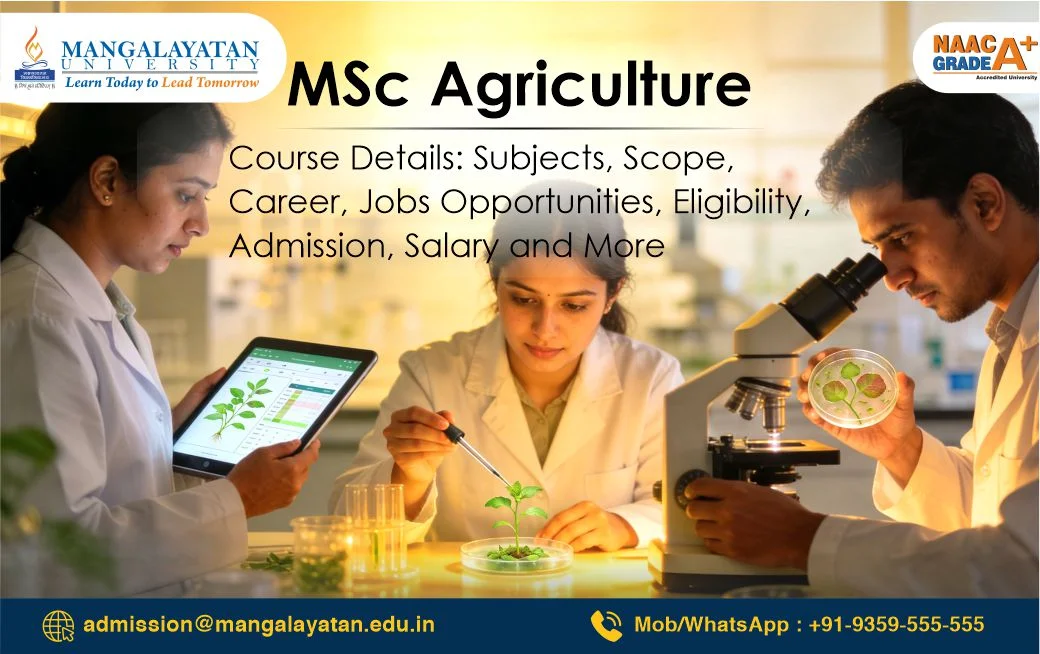MSc Agriculture Course Details: Subjects, Scope, Career, Jobs Opportunities, Eligibility, Admission, Salary and More
Introduction
The agricultural industry is a very significant part of the Indian Economy. The Agriculture Industry is one of the important industries in the country. It is the backbone of food, fuel and the rural economy of the country. Approximately 58 % of India's population relies mostly on agriculture for their livelihood. Agriculture is the largest source of income for families, and a significant amount of money is spent on fuel and equipment to maintain this sector.
One of the largest sectors in India, food processing contributes 32% of the nation's total food market and is rated fifth in terms of production, consumption, export, and projected growth. In FY21, exports of agriculture and related products amounted to us$41.25 billion. And by 2025, Inc42 projects that the Indian agricultural sector will grow to a value of US$24 billion.
Agri Industry is growing in the current decades. It is still one of India's leading industries in 2019, employing more than 42.6% of the nation's workforce, which is further expected to rise. Hence, it is clear that professionals having a degree or certification in Agriculture will experience a great scope for development. However, as a result of scientific and technological developments, the agriculture sector has experienced extraordinary growth. With origins in many different industries, numerous universities currently provide a broad range of Agriculture courses, from bachelor's to doctoral degrees, worldwide. Although undergraduate programmes offer a strong conceptual basis, a master's degree is necessary to flourish in the field. One such degree is the MSc in Agriculture.
Therefore, we have compiled all the relevant details about this course like its scope, eligibility criteria, career possibilities and more, in this blog that you can take into consideration.
What is MSc Agriculture Degree – Overview
A career in agriculture is a great choice. With numerous work opportunities in a range of agricultural industries, it is a very rewarding course for students. MSc Agriculture is a two-year full-time master's degree with a concentration in agricultural science and various cutting-edge agricultural methods.
The course covers scientific knowledge in the areas of agriculture and farming with an emphasis on farm equipment, Plant Physiology, Horticulture, Entomology, Agronomy, Biotechnology, Agricultural Economics, Farm Management and Biochemistry. A dissertation project and industrial training are also part of the course curriculum to give students practical experience. Students can learn more about the numerous sorts of specialist courses offered in agricultural studies through this course.
MSc Agriculture Full Form
MSc Agriculture stands for Master of Science in Agriculture. It is a two years post graduate degree course that offers advance knowledge in concerning modern methods of farming, crop production and other agricultural sciences.
MSc Agriculture Course Objectives
MSc Agriculture course demands a high level of proficiency in agriculture and biology as well as knowledge of fundamental agronomic practices.
Candidates who enrol in this course will develop a deeper comprehension of agricultural science's theoretical and applied components, as well as how these elements are used in a range of applied courses. Additionally, they will learn how to understand a range of cutting-edge technologies which will help the agriculture sector prosper.
MSc Agriculture: Course Details
Let's look at some of the highlights of the MSc Agriculture course to have a better understanding of the course structure and nature.
| Full Form | Master of Science in Agriculture |
| Course Level | Masters |
| Course Duration | 2 years |
| Eligibility | 50% Marks in B. Sc. (Agriculture) |
| Course Fee | INR 50,000 |
| Examination Type | Semester |
| Admission Process | Entrance Exam or Merit Based |
| Average Salary After Degree | INR 3.5 to 4 LPA |
| Recruiting Companies After Degree | Coromandel Fertilizers, Buhler India, Monsanto India, Bayer Crop Science, etc |
MSc Agriculture Course Duration
Generally speaking, it is 2 years master’s degree. The two years are broken up into four six-month-long semesters. Students will be exposed to a distinct collection of academic courses and real-world applications associated with those disciplines during each semester. Some institutions may offer a full-time or part-time MSc Agriculture program.MSc
MSc Agriculture Course Eligibility Criteria
The following requirements must be fulfilled to be eligible for the MSc Agriculture course:
- Students must obtain their degrees from an accredited university in fields like agriculture, forestry, or horticulture.
- Aspiring candidates must have earned a minimum cumulative grade of 50% in physics, chemistry, and biology, which are required courses, in their 10+2 education.
- A candidate with a BSc Agriculture course degree is majorly preferred.
MSc Agriculture Admission Process
Depending on the institute, different steps are involved in admission. Based on academic achievement and a PI, some universities provide direct admission to MSc Agriculture program, while others require applicants to sit for entrance tests at the national, state, or university level.
MSc Agriculture Course Fees
The fee of an MSc Agriculture program may differ between colleges. Due to its infrastructure and amenities, a government-sponsored institute can charge less than a private one. An MSc in Agriculture course at a private university cost approximately INR 50K/year.
MSc Agriculture: Subject & Syllabus
The MSc Agriculture program's subjects and modules are created to provide an in-depth analysis of effective agricultural practises and resource management strategies, as well as different specialised studies. The growth of the agricultural industry will increase output rates and the effective use of available resources. This would have a big impact on the economy as agriculture is one of India's major economic contributors.
The topics and disciplines offered by each college may vary depending on the course modules. Several of the subject areas include:
| Horticulture | Plant Breeding & Genetics |
| Agricultural Economics & Farm Management | Food Science & Technology |
| Forestry | Biotechnology |
| Plant Pathology | Plant Physiology |
| Entomology | Extension Education |
| Horticulture | Plant Breeding & Genetics |
MSc Agriculture Course Specialization
There are several specialisations available for the MSc in Agriculture, including agronomy, horticulture, forestry, genetics, and plant breeding.
An MSc Agriculture graduate's initial pay ranges between INR 3.5 to 4 LPA. The pay raise will also rise in tune with experience and skill level. The wage varies according to the popularity of the company and whether the position is in the public or private sector.
MSc Agriculture Future Scope in India
The Program will provide you with an in-depth exposure to an area which is the backbone of the Indian economy and the world. This course is designed to provide you with a deeper understanding of the complexities of an agricultural sector and its impact on development and nutrition around the world. Therefore, the value of an agriculture degree after graduation is indeed very significant.
The industry offers a wide range of job options. Both the public and private sectors are viable job options. The prospects improve twofold if you want to pursue post-graduation to broaden your knowledge in the area. Also, you can enjoy Officer level roles if you have an MSc in Agriculture. With an MSc, you can work for several government banks handling loans and other important agricultural agreements. Consequently, you might also try your luck there.
The growth scope of an MSc Agriculture holder is not constrained. The potential in private businesses is also positive. After receiving your PG degree, you can easily apply for managerial positions at several reputable plantations. Prospective employees may also like working with Fertilizer Manufacturers' companies. You'll be happy to learn that lecturing positions are also available in private businesses. A variety of private intuitions hire MSc-degree graduates to give lectures. As a result, after you get an MSc in Agriculture, finding a respectable job won't be a problem.
Career or Jobs Opportunities after MSc Agriculture Degree
The purpose of the MSc Agriculture program is to provide agricultural grads with training and skills for career opportunities in the current and future context of agriculture. This course is of relevance for graduates who aspire to a career in areas related to agriculture, rural development, nutrition, nutrition science, environment and rural health.
A broad range of employment opportunities can be witnessed in this field. Clearly demanding, but also enjoyable to do, the responsibility of the diverse in the area of agriculture. You can obtain high-profile roles even abroad with talent and work experience. The professional potential in the field is enormous, resulting in the form of the lucrative pay scale and demanding job roles. However, with higher employment positions, experience and expertise, the income also increases.
Top 5 Career Opportunities that you can opt for after Completion of your MSc Agriculture Degree:
- Agronomist - An agronomist is responsible for a variety of responsibilities, including soil mapping, product training, fertiliser consumption patterns, crop planning, handling technical questions, and farmer education.
- Research - ScientistResearch scientists are mostly in charge of creating improved farming tools, combination grain seeds, and innovative technology.
- Farm Manager- Managing and maintaining a farm is the responsibility of a farm manager. Furthermore, he supervises the planting, nurturing, and watering of the crops.
- Corporate Sales Manager- The primary responsibility of the corporate sales manager is to handle the distribution of goods to farmers, such as pesticides, exotic crop seeds, and other equipment.
- Professor- The knowledge of numerous agricultural breakthroughs is taught to the students by a lecturer. Students who want a career in teaching should enter this profession.
How to Choose the Top MSc Agriculture College?
India's fastest-growing industry is the agricultural sector. It is attracting a sizable population of students as a result of its positive expansion.
Students should keep the following aspects in mind while choosing an MSc Agriculture college:
- Levels of exposure (both national and international);
- Recognition;
- Academic Success;
- Program Syllabus;
- Teaching Approaches;
- A supportive and diversified campus atmosphere;
- Placement Support
Top Companies Hiring MSc Agriculture Graduates
- Wise Monk
- Coromandel Fertilizers
- Buhler India
- ONganic Foods Pvt Ltd
- Monsanto India
- Bayer Crop Science
- Gulzar Group of Institutions
Benefits of Pursuing MSc Agriculture
- There are many different employment opportunities available.
- The agricultural sector is rapidly expanding each year.
- The demands are considerable for various job roles.
- Each employment position has a sizable annual salary scale.
Required Skills
- Communication skills
- Critical thinking skills
- Time management
- Access to advanced research
- Problem-solving and more.
MSc Agriculture: Related FAQs
Q1 - What is the best option after MSc Agriculture?
After completing the MSc Agriculture course, some of the best options include becoming an Agriculture Officer, Technical Manager, Assistant Plantation Manager, Territory Manager, and Trial Co-ordinator
The agriculture industry has seen phenomenal growth as a result of scientific and technological advancements. Numerous institutions worldwide today provide a wide range of comprehensive agriculture courses from bachelor's to doctoral degrees, with their roots spanning numerous industries. Although undergraduate programmes develop a solid conceptual foundation, attending a master's programme is necessary to succeed in the area.Interested in studying an MSc in Agriculture at a best private university In India Concerned about the admission criteria? So why are you still holding out? Contact our professionals at Mangalayatan University to seek support by filling out concerns for the admission process and much more.









